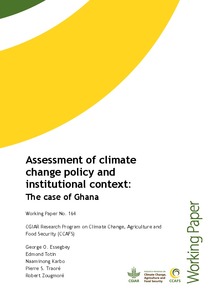Climate finance in Ghana
An analysis of climate finance flows in Ghana shows that an annual average of USD 830 million was tracked in 2019 and 2020. This is a meagre 5-9% of its required investment — estimated between USD 9.3-15.5
An analysis of climate finance flows in Ghana shows that an annual average of USD 830 million was tracked in 2019 and 2020. This is a meagre 5-9% of its required investment — estimated between USD 9.3-15.5
Ghana is losing about 15 million cubic metres of forest reserves per annum due to legal and illegal logging, bush burning, illegal mining and settlements. According to the Food and Agriculture Organisation
Three new but independent studies have recorded breakthrough against two of the most deadly diseases in Africa- tuberculosis (TB) and malaria. Results of a new study involving over 3, 000 women in Burkina

Mainstreaming climate change strategies on the basis of Science, Technology and Innovation (STI) into agricultural food security policies demands multi-dimensional approaches. In sub-Saharan Africa, the
Parts of Ghana are reeling under acute water shortage as taps have stopped running and raw water sources are drying up. A combination of drought and illegal mining activities as well as unsafe environmental
The National Food and Agric Show (FAGRO) Secretariat, has released events labelled as “action-packed” to guide its 2016 food and agriculture demonstration, aimed at repositioning Ghana’s agricultural sector
Six people have been confirmed to have died of Pneumococcal and Meningococcal meningitis in the Ashanti region. Four of the deaths were attributed to Pneumococcal meningitis while the other two deaths
<p>Civil registration and vital statistics systems are increasingly recognized as drivers of human rights, health, and development programs—especially for women and children. Vital statistics systems
Ghana’s savannah ecosystem has been subjected to a number of climatic hazards of varying severity over the past three decades. This paper presents a spatial, time-series analysis of the impacts of multiple
Brimming with shade trees and bounded by the Tuma river, the lower climes of Roger Castellon's farm in Nicaragua's mountainous Jinotega department were long ideal for growing coffee. But with temperatures
The Environmental Protection Agency (EPA) is introducing on a pilot basis a new locally made energy efficient cooking stove for use by rural dwellers across Ghana, as a means to prevent or reduce the use